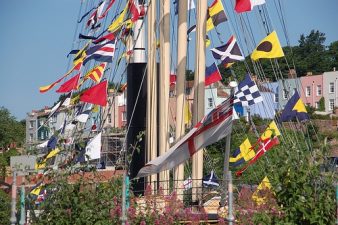 Worried about the impact of the tourism industry on the world’s resources? Want to know whether tourism sustains or destroys local communities and ecology in the developing world? Then this is the book for you.
Worried about the impact of the tourism industry on the world’s resources? Want to know whether tourism sustains or destroys local communities and ecology in the developing world? Then this is the book for you.
‘The Final Call’ is a thoroughly good read and I had to remember that I was actually meant to be reviewing it.
In The Final Call, Leo Hickman takes the reader on a journey to the most popular tourist destinations in the world and uncovers the facts about the impact of tourism: exploitation of citizens in developing countries; destruction of natural resources and ecological systems; imbalances of power and control.
The book is well researched and includes reference to reports, documents, policies and initiatives from all the major players in the industry, whether they are governments, environmental and campaigning organisations, tour operators, or travel guide writers.
He balances facts and figures with personal observations and behind-the-scene interviews with bartenders, prostitutes, cruise captains, local people, industry leaders and public officials. Exploring the rights and responsibilities of all concerned, he highlights the socio-economic factors at play in countries aspiring to develop and gain wealth; the increasing uptake of opportunities for tourists; and globalization.
 For me, the chapter that conveyed the extent of human exploitation the most was A Message for Mr. Average, based on the Sex Tourism Industry and the sexual exploitation of men, women and children in Bangkok and Pattaya, Thailand.
For me, the chapter that conveyed the extent of human exploitation the most was A Message for Mr. Average, based on the Sex Tourism Industry and the sexual exploitation of men, women and children in Bangkok and Pattaya, Thailand.
In it the lives of some of the women who work in the industry were portrayed. One was described as follows: ‘The others all call her ‘Superstar,’ as she regularly attracts two men a night to pay to have sex with her.’; another disclosed “I’m a bad girl, I know, but I feed twelve people in my family by working here.”
The stories captured what human price is being paid to keep sex tourists entertained. The chapter also explored the dynamic between tourists and those who sold their bodies to them as well as the impact of work being done to stop child prostitution.
Some tourists felt they were enabling the prostitutes to gain wealth, others saw the opportunity for cheap sex. ‘Several said they would never use a prostitute anywhere else in the world. Thailand is different, first because “it’s very easy and convenient” to buy sexual services here, and second because Thai women are so “natural” and “innocent” that the transaction doesn’t feel purely commercial.’
Leo Hickman is not afraid to the point the finger at the real winners: those with the money and power to invade a destination; mine its virgin territories; leave it hollowed out and conquer somewhere new.
The bottom line?
Action needs to be taken on a global and individual basis to stop the destruction of the world’s natural resources, the exploitation of local communities in developing countries and climate change.
This book gave me plenty to think about.
Having read it, I can see that it will take a concerted and persistent approach to bring about change, particularly in aviation; air travel has the largest carbon footprint.
At one point, Leo Hickman draws a parallel between the Tobacco Industry and the Tourism Industry. I’m writing this review in Bristol in the UK, a city that has been founded on tobacco and slavery. It is plain to see that it has taken decades since governments and tobacco companies were first informed that cigarettes damaged health for real change to occur in cigarette consumption.
This has involved heavy taxation; health promotion and information campaigns; banning cigarette adverts and promotional activities; introduction of health warnings on cigarette packets; numerous Stop Smoking initiatives; and, most recently, banning smoking in public venues.
Cigarettes are still sold and people still smoke. And what of the individual’s response? Unlike the smoker, who pays through the nose for a packet of cigarettes, starts to feel unfit, begins to cough and suffers increased respiratory infections, the impact on the average traveller of their carbon footprint or relationship with local communities abroad is not personally apparent, so it is easy to turn a blind eye to any damage caused. There is a lot to learn from this parallel if we want change in the tourism industry.
How many decades could it be before we see effective change in the Tourism industry? (like cycling)
The book left me with many questions: Of the sex tourism Industry. If we believe we shouldn’t provide brothels in Britain, why should we ignore Britain’s using them abroad?
Of the cruise industry. If we wouldn’t empty our sewage into the local lake, why should we empty it into someone else’s?
Of the exploitation of workers’ rights. If we demand a certain standard of pay and safe working conditions here, why should we not demand the same for those who work elsewhere?
With all that said, this book gave me a desire to see the places Leo Hickman visited and go on a cruise. And why shouldn’t I? I have the right to, don’t I?
‘The Final Call’ by Leo Hickman (editor of the Guardian newspaper’s environment pages) published by Transworld, UK
Reviewer Louise Gethin was brought up in Bristol, Louise has lived in France, Germany and New Zealand, and has spent time holidaying in Jerusalem, Spain, Ireland, Indonesia, Australia and Singapore. Originally trained as a nurse, she spent four years working with people with HIV in the mid nineties. Highlights of her life include: trekking to Annapurna Base Camp, Nepal; working in New Zealand; being an aunt to three nephews and two nieces; and living for three years on a houseboat only a stone’s throw away from Windsor Castle. Now she shares her Bristol allotment with Green Prophet’s reviews editor James! (read Louise’s earlier review of ‘The Guardian Green Travel Guide’ here)
This review is the first in a new summer season here on Green Prophet of environment-focused book & documentary film reviews. If you have, or know of a book you’d like to see reviewed (or would like to review it yourself!), get in touch!
Top image via The Guardian.



